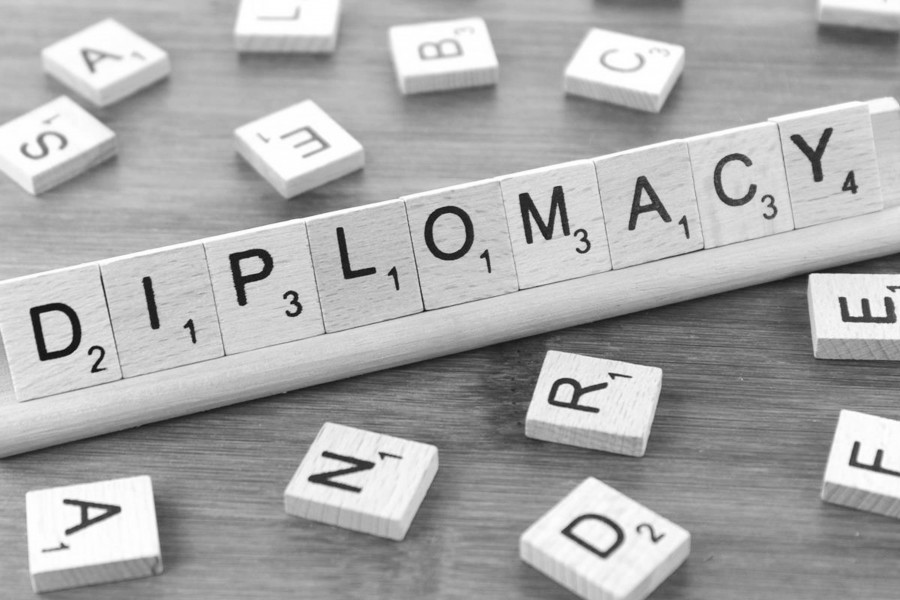
Published :
Updated :

Since the foreign policy of a country is the first line of defence, therefore, further evaluation of the policy needs to be done in view of the emerging global scenario. Competing interests of two emerging powers in Asia need to be assessed in the interest of Bangladesh, because the country is sandwiched between the two: China and India.
Geographically, Bangladesh is located on three sides of India and it also borders Myanmar with the Bay of Bengal to the south. But the distance between Bangladesh and China is not that far either. Bangladesh's close-door neighbour India is trying to flex its economic and political muscles in South Asia, apart from beyond its corridor while China in Far East did not keep quite either. China is bent upon becoming a global military and economic power. China turns out to be the second largest economy of the world by now. In fact, Bangladesh is sandwiched between two big neighbours. Therefore, Bangladesh should play an equidistant policy between two giant neighbours. There is no need to have hobnobbing relations between the two neighbours. Unfortunately, Bangladesh has no card in hand to resolve some vital issues that Bangladesh is confronted with India.
Uday Bhaskar, an analyst with South Asia Monitor, holds the opinion that "Prime Minister Sheikh Hasina has been more receptive to India's overtures so it's easier to realise India's objectives." Recently the government of Bangladesh has provided an opportunity for India to reach out to the North-Eastern region through a narrow and tenuous land corridor. In fact, Arunachal Pradesh, one of the seven landlocked Indian states, has become a contentious issue between China and India.
There is no second opinion that water is vitally important to lower riparian Bangladesh indeed. As of now, Bangladesh is being deprived of the due share of water from the Ganges, Brahmaputra and Teesta in particular. During the monsoon period Bangladesh is at the receiving end, because sluice gates are opened by India on their dams. The BBC reported in September of 2000 that emerging releases from at least four dams in West Bengal added to floods across the border into Bangladesh. As a result, Bangladesh was flooded losing agricultural products that forced Bangladesh to import a substantial amount of food grains putting pressure on its balance of payment. While serving in the Bangladesh embassy in Germany as Charge d' affaires in 1998 we faced a critical situation in Bangladesh which witnessed the worst flooding in living memory. This writer mobilised opinions in the government and private sector of Germany to assist the Bangladesh government in mitigating the disaster. The German government provided ten million Euros while water purifying machines were flown to Dhaka WASA by courtesy of the Biman Bangladesh Airlines. The private sector in Germany provided baby food and medicine as well.
As of now, there is no resolution in sight to the problem of sharing water of the Teesta and Feni rivers, although Prime Minister Narendra Modi during his maiden visit to Bangladesh on June 07 2015 pledged a fair solution to the Teesta and Feni water sharing. He said, "Water sharing is, above all, a human issue as it affects the life and livelihood of the people." Absence of the due share of water during the lean period has caused enormous ecological damage to Bangladesh. It is high time that both Bangladesh and India make all-out efforts to resolve the water sharing problems for the benefit of both countries.
Since Bangladesh has been confronting a man-made disaster with the influx of Rohingya refugees since 2017, Bangladesh should press both India and China vigorously to put pressure on the Myanmar administration to take them back and resettle them as their citizens. Both India and China have their stake in Myanmar. Curiously enough to note, both China and India have invested heavily in the Rakhine state of Myanmar. Refugees from Myanmar in Bangladesh, if the issue is not resolved peacefully, would likely create a breeding ground for terrorism and cutting of trees for using fuel would likely be a catastrophe ecologically.
Although Bangladesh has been acclaimed for success on the economic front and the UN committee for development policy declared that Bangladesh would likely graduate from the LDC status to a developing country by 2024, it has been termed 149th least corrupt nation out of 175 countries, according to the 2018 corruption perception index of the Transparency International.
This being the situation as of now no amount of diplomacy, including economic diplomacy will be fruitful, unless basic conditions in Bangladesh radically improve.
Mohammad Amjad Hossain, retired diplomat from Bangladesh and former President of Toastmaster International club of America, writes from Virginia .
mahossain


 For all latest news, follow The Financial Express Google News channel.
For all latest news, follow The Financial Express Google News channel.